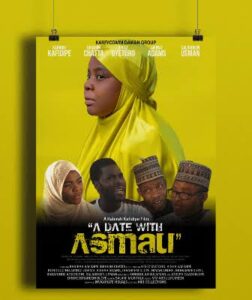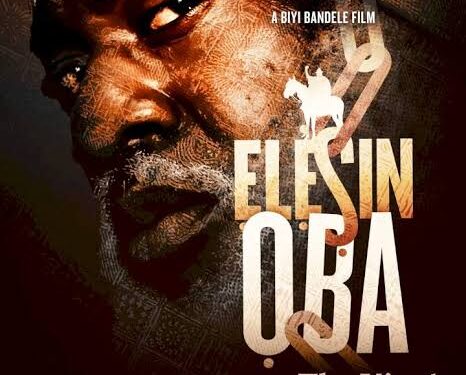It all began on September 30, 2022, shortly after thousands of movie lovers watched the much talked about Nollywood movie, ‘Anikulapo’ on Netflix. The movie was greeted with uproar, as those who had watched it warned of sex, nudity and violence scenes. Many Muslim brethren quickly went on social media to vent their anger and disappointment over what they called needless explicit ‘sex scenes’ between the lead actors, Saro Alaso Ofi Lati Ilu Gbongan and the delectable Olori Arolake.
However, while the lamentation against the film directed by one of Nigeria’s leading fimmakers, Kunle Afolayan, continued on one hand, because of the claim it erodes the Yoruba culture and runs foul of ethical values; guess what? The movie ranked no 1 globally on Netflix, with over 8 million views in less than a week, perhaps, because of many who purposely renewed their account in order to watch the movie on account of the controversy generated by it.
Barely over a month after, the streaming platform released another sponsored Nigerian film, “Elesin Oba: The King’s Horseman”, on Friday, November 4. Surprisingly, many Muslims have also watched this same movie that contains ‘few’ sex and nude scenes like Anikulapo, in less than 24 hours! Unsurprisingly, it’s the same complaint; the unnecessary sexual scenes!
Sad but true, despite condemnations, Muslims and non-Muslims will still watch it. Although it might not break Anikulapo’s record, the figures of the viewership will most likely increase in the next couple of days. Those who have watched it before may still rewatch it! Like Anikulapo, some will still go and watch the sexual scenes for whatever intent, just like some may skip those scenes to maximise the viewing time.

Well, their agitations and concerns are quite understandable, after all, customers are always right, so says the popular axiom. “But what about the other customers who derive joy in those scenes? What about those who purposely wanted to the see the movie because of obscenities? Don’t they have their own rights?, After all, the movies aren’t for kids!”, many will likely ask. This is sadly the reality of the industry today!
With my years experience in the entertainment industry, before I left it to establish Muslim News, criticisms or not, movies with sexual scenes pull more viewership than those without it. Before the coming of Netflix, there has always been nudity and sexual scenes in Nollywood movies and it’s probably going to continue, except and until the National Film and Video Censors Board (NFVCB) urgently does something about it.
For instance, a study recently showed that Nigeria is the highest porn-watching country in the world. So, one might argue to say it’s of lesser evil to watch 1, 2 sexual scenes on Netflix, or even skip it, than watching porn, with outright disregard for human dignity. After all, they’re not careless enough to show it all, like in the case of porn!
Some may argue that those nude and sexual scenes might not be real after all, claiming movies are make-believes, meaning there are cases where they use special body suits or prosthetics makeups, like the case of Anikulapo, based on the statement attributed to the effect guru, Hakeem the Magic.
There are other times filmmakers use body double for sexual scenes. Although this is common in most foreign movies, few Nigerian big budget movies, such as Alter Ego, 2017 movie directed by Moses Iwang, adopted it for Omotola Jalade-Ekeinde, who played the role of Ada Igwe, a human and child’s rights activist.
Others in the entertainment industry may also argue that these scenes might be necessary to illustrate and understand the plot and character development, as captured by Afolayan in the case of Saro and Arolake in ‘Anikulapo’, and the case of the sex-driven Elesin Oba, who couldn’t sacrifice himself to serve his ruler in the afterlife due to his sexual desires in late Biyi Bandele’s Elesin Oba.
Many filmmakers have also argued that making a scene to indicate sexual activities taking place is utterly impossible without nude and sexual scenes, real or imagined; saying, “apart from the actors playing lovers on set, there are countless of other crews in the room, teaching them how to make it real! So, they aren’t alone, and it’s not real”, so goes the argument.

A few days ago, a Muslim actor who went for Hajj 2022 posted a video of himself smoking shisha on IG, just because of the new film they are about to shoot. A whole Alhaji, one would say! Yet, he must make it look real, just like the cases cited in the two aforementioned movies. The examples are endless but one thing is certain, Nollywood is a multi-billion dollars industry that is commerically driven, with different business interests, which has disregard for morality. Why do we think some born-again Christians and conscious Muslims left the industry? It’s either you join them or you quit!
I know some great guys that had to quit despite their passion and forgo their acting prowess! This is quite sad, shameful, but the reality!
Our sister, Kabirah Kafidipe for instance, would have been a different story if not for her decision to remain modest! She could have been as big as Kunle Afolayan, because they both had promising futures when they featured as ‘Araparegangan and Aresejabata’ in the 1999 epic, ‘Saworoide’, but she decided to switch, telling her story from the Islamic perspective. Sadly, people like Kafidipe, who recently dropped her first faith-based movie, A Date With Asmaau, aren’t getting enough support from their brethren, who will prefer to watch the nude movies and still come online to criticise such movies.
Besides Kafidipe, there are lots of promising Muslim youths who have been trying to change the narrative in the morally bankrupt and already saturated movie industry, but I guess their Islamic theme production is not really making headway. Why? We aren’t giving them enough support, though they also need to step up their games! Friends like Wonu Tahj, Tohib Adejumo and Fuad Akorede to mention but a few are giving their best.
Here, I am speaking like a Muslim. Let’s rally round them and give them the needed support.
I was among the few that pushed the idea of Islamic movies as an alternative for the Muslims. In fact, a chapter titled, ‘Portrayal of Muslims in Movies’ was dedicated to address the challenges and the need for such industry as far back 2009 when I published my book, “Muslims and the Threats of the Media”. By 2010, I joined a leading softsell journal in Nigeria to penetrate the industry and I did my best, until I opted out due to my motor accident in 2015.
The solution is here. Nigerian Muslims also need to train a lot of filmmakers, scriptwriters and actors, and churn out faith-based movies, where both the cast and crew will ‘ensure’ to observe religious ethics at the very least. There are great Islamic-oriented stories or books that need to be told or adapted into movies for Netflix or other viewing platforms.
No matter how brilliant Afolayan is, he can’t tell a Muslim story better than a Muslim filmmaker, like his boss, Uncle Tunde Kilani (TK)! A non-Muslim actor will give his best to interpret his script but he can’t get it better than a Muslim actor who has a sound Islamic knowledge and background. This is one of the reasons many pundits revere thespian, Ibrahim Chatta, though underrated, as one of the best Muslim script interpreters in the industry. So, the Muslims need many of Chattas in the alternative movie industry, which I once tagged Halalwood, just like Nollywood. Though, the title appears a misnomer.

As a conscious Muslim, it’s not a must to go on Netflix. And if you go, it’s not a must you watch the r-rated movies. Interestingly, on the same Netflix, there are countless faith-based movies, even with amazing storylines good for all ages, without restrictions and sexual warning, very educative, informative and soul inspiring. For instance, Dirilis Ertugrul, a Turkiye-faith based series, has been on Netflix since 2014, yet, many Muslims who watched Elesin Oba in less than 24 hours, might not have seen this series that later became the best dramatic work in the history of global drama! Surprisingly, it was watched by non-Muslims, some of whom ended up embracing Islam, after their exposure to the reach Islamic history.
‘I don’t like series’, some of my Muslim brethren would say, but there are other faith-based movies on Netflix. You know, the major problem facing Muslim youths today is extremism, and a movie like ‘the Flower of Alepo’, released on Netflix since 2016 will guide our children and ward them away from joining brainwashed groups who use different tactics to lure innocent knowledge seekers into their folds, etc.
By Rasheed Abubakar, Publisher, Muslim News Nigeria Email: rawshield123@gmail.com



